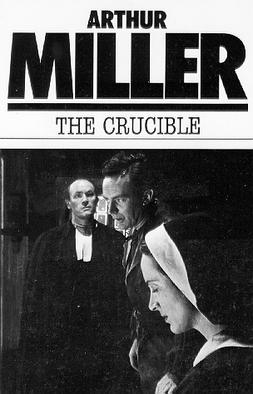PROCTOR: You are the high court, your word is good enough! Tell them I confessed myself; say Proctor broke his knees and wept like a woman; say what you will, but my name cannot--
DANFORTH, with suspicion: It is the same, is it not? If I report it or you sign to it?
PROCTOR--he knows it is insane: No, it is not the same! What others say and what I sign to is not the same!
DANFORTH: Why? Do you mean to deny this confession when you are free?
PROCTOR: I mean to deny nothing!
DANFORTH: Then explain to me, Mr. Proctor, why you will not let--
PROCTOR, with a cry of his whole soul: Because it is my name! Because I cannot have another in my life! Because I lie and sign my name to lies! Because I am not worth the dust on the feet of them that hang! I have given you my soul; leave me my name!
The Crucible is famously an allegory for McCarthyism, in which the accusations of witchcraft which rapidly multiply in 17th-century Salem stand in for the similar mania for secret Communists which Joseph McCarthy inspired in the 1950's. But allegories are reductive--once you have observed that X is a representation of Y, or that Napoleon is Stalin and Snowball is Trotsky, you have solved the puzzle the allegory represents and need go no further. I didn't find the McCarthyism angle necessary or helpful in reading The Crucible. Yes, Miller draws parallels between the 17th and 20th centuries, but The Crucible is far less interested in using the past to illuminate the present than it is in observing something frightening and true about human nature: the fragility of community, and the tyranny that public morality can exert over the moral self.
What happens in Salem happens, Miller observes, thanks to a poisonous mix of noble motives and evil ones. Governor Danforth, who sentences Proctor and others to hang for witchcraft, is never anything less than a devout, if myopic, figure who takes Proctor's claims that the accusations are false quite seriously. But others, like Putnam, seize the opportunity to punish their enemies and seize their property once they've been accused. The worst of these is Abigail, the chilling villainess of the play, only a teenager, whose calculated show of being afflicted by witchcraft is terrifying in its malice. Abigail, having had an affair with Proctor, makes his wife one of her principal targets--as Proctor says, she "means to dance on my wife's grave." At the end of Act III, Abigail whips herself into a possessed frenzy in front of the courtroom, pretending to be menaced by the spirit of a girl she wants to ruin--and ultimately forces an abject apology out of the very girl she wants to destroy. It's a frightening moment, partly because of Abigail's shameless cruelty, but also because it shows how weak the individual spirit can be. It's probably awesome on stage.
The hero, Proctor, is not a very good man--he has an affair with Abigail, after all, and is renowned for not being much of a churchgoer--but fights valiantly to preserve his own sense of right and wrong in the face of immense social pressure. At the end, in prison, he faces a choice: sign his name to a confession and live, or refuse and be hanged. The choice is between public absolution and private morality--is it worthwhile to be a good and honest man, the play asks, if it means the rest of the world sees you as a bad one? Proctor begs to keep his name, though he's given the community his soul, but it seems like the terms have gotten switched around: his name, that part of his identity which belongs to the community, has already been robbed from him, but his refusal to sign the document allows him to retain something of himself, even at the cost of his own life.
Putting The Crucible in the McCarthyism box prevents us from really understanding the power of Proctor's doomed choice, and from realizing that we still fall prey to the same kind of savage mania as the Puritans. I'd argue that, in the social media age, we're constantly finding new victims on whom to exert the will of public shame. Like Danforth, sometimes our motives are essentially good ones--I'm looking at you, Racists Getting Fired Tumblr page--but we fail to anticipate the destruction and abuse they foster, and so we devour ourselves.


3 comments:
Man, great review. I read this last year and was amazed at how powerful it was. The McCarthyism angle didn't do much for me either. I liked the sense of hopelessness--every new angle Procter finds is easily shut down by Abigail because she understands how people work so much better than he does.
She's terrifying. One of the scariest villains in literature, I think.
When I teach it I sort of address it as "Look at this horrible thing that humanity just keeps doing" starting with the witch trials and ending with whatever horrible thing is currently happening that could be compared to a witch hunt annnnnd we are all just sort of sad about life. I also make my students make comparisons between the people they know and the characters in the play (who is naive/intelligent, who is a manipulative/liar, who is upright/hypocrite, etc) to see that these types of people are a part of our daily lives.
I basically depress the heck out of my students by showing us all how terrible it seems people always have been and continue to be.
Fun Fact: I like the ending of the movie the Crucible better than the play. In it, the three people being hanged start reciting the Lord's Prayer in unison in front of the crowd. It's incredibly powerful.
Post a Comment